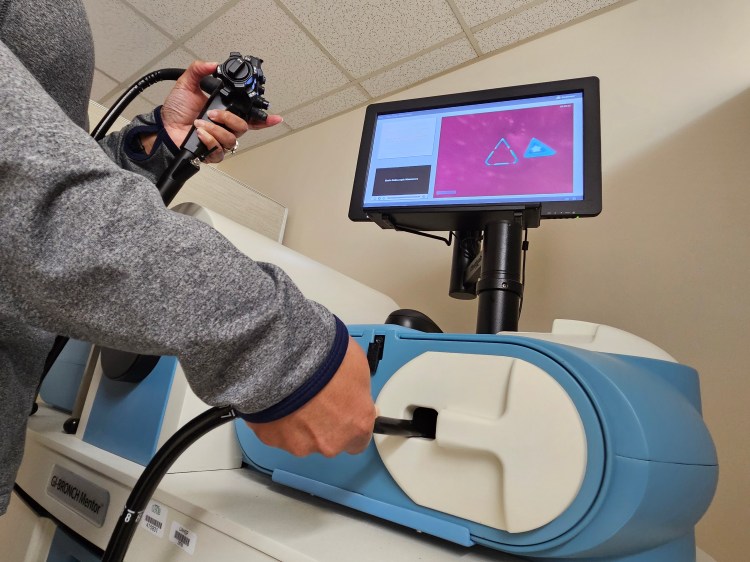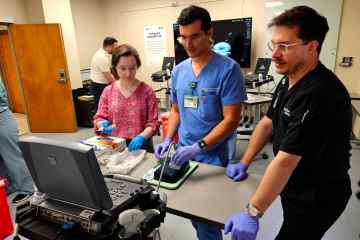Independent Study Simulator Lab offers 24/7 learning

UAB Clinical Simulation’s motto is “Sim First.” By simulating first, participants benefit from a proven and powerful patient safety tool, which is now available 24/7.
The Independent Simulator Study Lab (ISSL) affords learners the opportunity to individually train on a variety of simulators that are available any time and day of the week. The ISSL is in UAB Hospital’s Quarterback Tower Room 202, accessible via the second floor of Jefferson Tower by anyone with badge access to UAB Hospital.
“Our goal is to provide the highest quality simulation tools and tactics so that everyone in the UAB Health System can practice and test their skills,” said Marjorie Lee White, M.D., vice president of UAB Clinical Simulation. “By offering 24/7 access to a variety of trainers and modules, we’re welcoming learners to ‘Sim First’ on their own, any time.”
The featured simulators are made possible through grant-funded support and through the courtesy of various departments within UAB Medicine. Current trainers include:
Simbionix LAP Mentor
This innovative LAP Mentor simulator provides hands-on laparoscopic training needed across multiple disciplines. With a growing library of modules, the LAP Mentor provides meaningful practice for all ability levels, from basic laparoscopic tasks to advanced complete procedure training. This trainer was funded by the University of Alabama Health Services Foundation General Endowment Fund, with Kerri Bevis, M.D., serving as principal investigator.
Simbionix GI-BRONCH Mentor
The GI-BRONCH Mentor platform offers a combined system for the training of both GI endoscopy and flexible bronchoscopy. This simulator provides multiple gastrointestinal training opportunities with patient cases offering realistic scenarios of clinical situations. Learners can practice numerous procedures, ranging from simple diagnostic procedures to advanced ERCP and Endoscopic Ultrasound procedures.
This simulator also offers a solution for the flexible bronchoscopy training needs of pulmonary and critical care physicians, anesthesiologists, and interventional pulmonologists. Modules cover both basic skills and complete clinical procedures.
This trainer simulator was funded by the University of Alabama Health Services Foundation General Endowment Fund, with Brent Andrew Ponce, M.D., serving as principal investigator.
CAE Vimedix
This high-fidelity simulator facilitates practice for cardiac, lung, abdominal and OB-GYN ultrasound—all on one common platform. The software and manikin combination offers a unique experience for learners. Learners will develop essential psychomotor and cognitive skills for ultrasound probe handling, image interpretation, diagnoses and clinical decision-making. The ISSL features three Vimedix simulators, two with cardiac and abdominal modules and one with OBGYN modules. These simulators were funded by the UAB Department of Anesthesiology and Perioperative Medicine, UAB Clinical Simulation and the University of Alabama Health Services Foundation General Endowment Fund, with Sheri M. Jenkins, M.D., serving as principal investigator.
ORSIM Bronch Trainer
ORSIM is a specialist flexible bronchoscope simulator with a wide range of realistic upper airway scenarios. Its virtual format enables part task training and promotes skill development and dexterity with a fully functional bronchoscope, while providing rapid exposure to multiple scenarios before clinical application. High-definition virtual modeling of a range of anatomy and pathology scenarios facilitates bronchoscope dexterity, building experience and knowledge. The trainer also includes metrics for objective scoring and performance evaluation, with instant feedback. It was funded by the UAB Department of Anesthesiology and Perioperative Medicine
Christopher Richardson, M.D., recently utilized a CAE Vimedix simulator for transesophageal and transthoracic echocardiography training and said that it “worked well,” while also praising simulation as a valuable learning tool.
“With the ISSL, learners have unmatched convenience and flexibility in their training and continued education,” White said.
To learn more, visit here. Email simulation@uabmc.edu to reserve simulator time in the ISSL or to inquire about simulator use for multiple learners.
UAB Medicine’s Clinical Simulation program offers opportunities for individuals and teams across UAB Medicine and beyond to practice before they deliver care. We encourage all who provide and support patient care to “SimFirst.” Together, we can put our patients’ safety first.




0 Comments